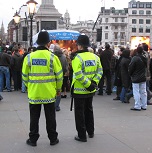
To mark the official launch of the code, the college asked 2,043 members of the public how they might deal with some of the ethical dilemmas faced each day by those in policing. More than two-thirds of respondents (68%) said they wouldn’t want to be in the position of a police officer or staff member when making those decisions and 40% of those surveyed felt the challenges facing the police when making decisions were harder than they previously thought.
It also revealed there was not always a clear consensus among respondents on the best thing to do in the scenarios and most respondents did not always find it easy to decide what to do.
The Code of Ethics will apply to more than 220,000 officers, police staff, contractors and volunteers working in policing. It sets out the standards of behaviour that the public can expect from officers and staff at every role and at every level and will help guide decision making.
The Code comes after the College of Policing was granted new powers under the Act to set codes of practice for police. In law Chief Constables must have regard to codes of practice.
College of Policing board chair Professor Dame Shirley Pearce said: “The code of ethics makes explicit the ethical principles that should guide the difficult decisions that everyone in policing has to make every day of the week”.
Its chief executive, Chief Constable Alex Marshall, added: “The vast majority of people who work in policing are hardworking, honest people who want to serve their communities. The Code of Ethics clearly defines the expectations of standards and behaviour for everyone in policing and brings policing into line with other trusted professions that have such codes, like those in medicine and law.”
The College of Policing has published an online video of frontline officers and police staff talking about the importance of the Code of Ethics and what it means to them. The video can be viewed HERE.